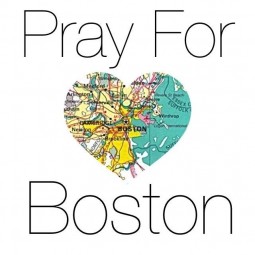Hope Amid Horror
Editorial: Lessons from Boston and other tragedies.

Cardinal Sean O’Malley was completing a pilgrimage for Boston priests in the Holy Land when he learned of the tragic deaths and horrific injuries following the bombings at the Boston Marathon.
The land that witnessed the ministry, suffering and death of Jesus Christ is no stranger to terrorist violence. In Boston, however, the heartbreak cast a shadow over the life of the city — and, indeed, the whole nation.
A terrorist attack vanquished innocent lives and destroyed the peace of a community.
Yet the heroic service of first responders and law enforcement officers who risked their lives, including the MIT policeman who lost his life, while on alert for the alleged perpetrators gave witness to goodness and self-sacrifice.
And, after his return, Cardinal O’Malley offered reassurance to his flock that the Good Shepherd was there to guide his sheep through the valley of death.
During his Good Shepherd Sunday homily, he reminded Bostonians that, after the Crucifixion, the apostles "scattered in fear, doubt and panic."
"On Easter, the Good Shepherd returns to gather the scattered; Mary Magdalene in grief, Thomas in doubt, Peter in betrayal," added the cardinal. "We too are scattered and need the assurance of the Good Shepherd, who lays down his life for us, who comes to gather us in our scatteredness, in our brokenness and pain."
In the wake of the violence in Boston, as well as in Newtown, Conn., and elsewhere, however, there is a growing awareness that the threat to the nation’s peace does not only come from terrorists abroad.
The specter of alienated young men wreaking mayhem has stirred a deep sense of disquiet about whether the next generation shares the values and beliefs of their forefathers.
The Boston bombings mark an emerging pattern of violent attacks by disturbed U.S. citizens disconnected from the social mainstream and seemingly unconcerned about the sanctity of human life.
During his homily at the interfaith service for the Boston Marathon victims at the Cathedral of the Holy Cross, Cardinal O’Malley sought to defuse the very human desire for vengeance in the face of unmitigated evil, but he also drew attention to a troubling cultural trend of spiritual alienation and hyperindividualism.
"In the face of the present tragedy, we must ask ourselves: What kind of a community do we want to be? What are the ideals that we want to pass on to the next generation? It cannot be violence, hatred and fear," he said.
"God has entrusted us … to repair our broken world. We cannot do it as a collection of individuals; we can only do it together, as a community, as a family," Boston’s archbishop continued. "Like every tragedy, Monday’s events are a challenge and an opportunity for us to work together with a renewed spirit and solidarity and with the firm conviction that love is stronger than death."
Young Americans are growing into adulthood in a culture marked by the breakdown of the family, the natural sanctuary for personal communion, where virtues are lived and transmitted to the next generation. Meanwhile, the Ten Commandments were long ago removed from public schools, and the vacuum is being filled by a shifting, undefined but strictly enforced ethos of political correctness.
A symptom of this trend is the cyberbullying of religious believers like Michael Potter, the president of an organic foods company, who has been attacked for suing the federal government over the contraception mandate. Citizens who challenge the "dogma" of so-called reproductive rights or gender neutrality are savaged by social media, though the moral principles at work are rarely articulated in a consistent manner.
The spectacle strikes fear or cynicism in the hearts of young Americans, but it does not have the power to inspire goodness and lead the young to make choices for the sake of the common good.
Brutal acts of terrorism force a culture to question its embrace of individualism as an escape from the demands of others. But the events of the Boston Marathon also raise questions about the worthiness and stability of our present value system.
"Blessed are those who mourn," states the beatitudes. This is not a celebration of misery, but, rather, an acknowledgement that the righteous are properly disturbed by the reality of evil in the world.
If we care nothing for goodness, our mourning is reduced merely to an expression of pain and distress.
Cardinal O’Malley’s reflections remind us that the New Evangelization is needed to guide believers and all people of good will to the "civilization of love" at the very center of the Church.
The recent horror on Patriots Day, he said during his homily at the interfaith service, "shakes us out of our complacency and indifference and calls us to focus on the task of building a civilization that is based on love, justice, truth and service."
"We do not want to risk losing the legacy of those first patriots, who were willing to lay down their lives for the common good," he continued. "We must overcome the culture of death by promoting a culture of life, a profound respect for each and every human being made in the image and likeness of God, and we must cultivate a desire to give our lives in the service of others."











